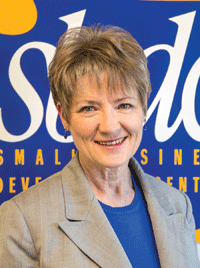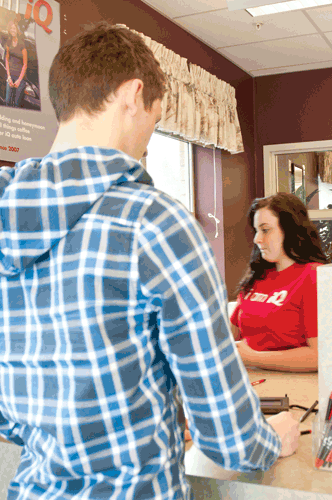 At least 15 banks turned down the O’Haras application for a Small Business Administration (SBA) loan before they found one that allowed the couple to step into the world of entrepreneurship. And even that loan might not have been approved without intensive counseling from volunteers at SCORE, a nonprofit network that connects entrepreneurs with retired executives.
At least 15 banks turned down the O’Haras application for a Small Business Administration (SBA) loan before they found one that allowed the couple to step into the world of entrepreneurship. And even that loan might not have been approved without intensive counseling from volunteers at SCORE, a nonprofit network that connects entrepreneurs with retired executives.
SCORE volunteers with experience in retail and banking repeatedly raked through When the Shoe Fits’ business plan until it was solid enough to win a bank’s approval and an SBA-backed loan, Alan O’Hara said.
SBA financing has played a key role in helping thousands of Pacific Northwest entrepreneurs over the decades, and last year provided $308.2 million in loans to 873 Oregon and Southwest Washington businesses alone. For companies that might not be able to get a traditional bank loan, the SBA may be the best way to fund growth. Yet countless companies never even consider this funding source because of confusion over how these government-backed loans work.
“The Small Business Administration does a pretty good job of communicating that SBA loans exist,” said Jan Harte, certified business advisor with the Small Business Development Center at Washington State University Vancouver. “But a lot of people don’t know how they work. You don’t go to the SBA and say, ‘I want an SBA loan.’ If you do, they will either say, ‘Go to your lender’ or ‘Go to SCORE or a Small Business Development Center and learn what’s involved in getting a business loan.’”
That’s because banks issue SBA loans, much as mortgage brokers, not the U.S. Department of Veterans Affairs, connect military veterans to VA-backed home loans.
SBA loans are not appropriate for every borrower that needs financing, added Harte. These loans come with origination fees and higher interest rates that can make them more expensive than other forms of financing.
 Bankers usually turn to SBA funding only when a business proposal is too risky for a traditional loan, according to Harte. When risky borrowers meet requirements set out by the Small Business Administration, the government agency promises to repay the bank if those borrowers fail to make their payments.
Bankers usually turn to SBA funding only when a business proposal is too risky for a traditional loan, according to Harte. When risky borrowers meet requirements set out by the Small Business Administration, the government agency promises to repay the bank if those borrowers fail to make their payments.
Harte offers two tips to business owners who think they may want to obtain an SBA loan:
1. Work with experienced advisors at SCORE or the Small Business Development Center to develop and fine-tune your business plan before you start applying for loans.
2. Set up a bank account with a financial institution that understands your kind of company, and then stay put.
There’s no one “best” bank for small business loans, because different banks have different strengths, Harte said. Community banks, for example, have experience with small regional businesses like When the Shoe Fits. But some companies need a bank with a large branch network, understanding of a specific niche industry, or experience financing international sales.
When the O’Haras went searching for $250,000 to fund their third store last year, they saw first-hand the value of a strong banking relationship. This time around, O’Hara said, the bank presented options that included both conventional and SBA loans, and ultimately the O’Haras opted to stick with SBA funding.
If you think you’re likely to need an SBA loan, going with a financial institution that has a history with the SBA program could be to your advantage, Harte said. Banks and credit unions that have demonstrated a strong understanding of the process can be certified as preferred lenders, and can approve SBA loans internally, while less experienced lenders must await Small Business Administration approval to fund a loan.
Even the most helpful banks are not business advisors, however, which is why SCORE and the SBDC can be so important to entrepreneurs in search of funding. If you’ve overlooked something when you bring your proposal to a bank, you’ll get turned down, O’Hara said. But expert advisors can prevent that from happening – or help you fix your oversight after the fact.
Some would-be-entrepreneurs might not like what these experts have to say, O’Hara explained, because if you’ve got a bad idea or are unwilling to take the risks necessary to succeed they are the ones to deliver the bad news.
“By the time those guys had raked us over the coals, we felt we had a pretty good packet to bring to banks,” O’Hara said.
“Unless you’ve got your ducks in a row and are absolutely ready, you could lose everything you’ve got,” he added. “This is not the right thing to casually venture into.”


